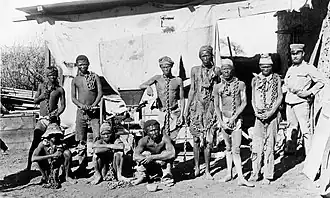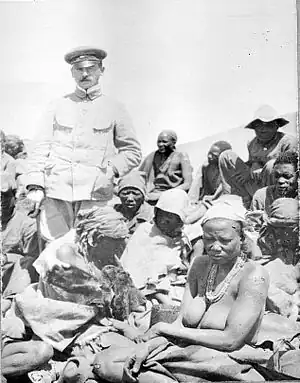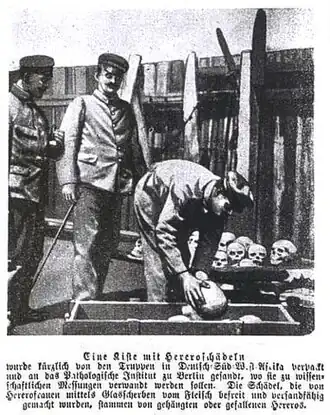Herero and Nama genocide

| The white man's burden Imperialism |
| The empires strike back |
| Veni, vidi, vici |
v - t - e
|
While the Belgians were suffering from the Congo fallout during the Scramble for Africa, the Germans also managed to sneak in a little bit of genocide in Deutsch-Südwestafrika (modern Namibia in southwestern Africa).
Background
Between 1903 and 1904, the rising German settler population in the area were straining the arid landscape's resources and causing discontent among the native tribes.[1][2] The most significant of these tribes were the Herero, who had managed to get their hands on horses and modern firearms.[1][2] Despite it being uncertain which side initiated combat, the Herero were able to put up a tenacious resistance to the Germans.[1][2] They were, however, inevitably defeated and forced to retreat into the desert. The Nama people would also rise up, with similar results.[1][2]
Genocide

The "driven into the desert" idea gave the Germans an idea. The German commander ordered his troops to drive every Herero man, woman and child out of their towns and shoot the ones who resisted.[3] Many thousands died of hunger and thirst, and the 13,000-or-so survivors were rounded up into concentration camps to be beaten and worked to death.[4] It is estimated that about 80% of the Herero and Nama population were exterminated.[2][5]
Aftermath

In a chilling foreshadow of the Holocaust, the Germans leveraged skull measurements to justify calling the Africans Untermenschen ("subhuman"), and experimented on some of the survivors.[2][6]
See also
References
- ↑ 1.0 1.1 1.2 1.3 Erichsen, Casper. "German-Herero conflict of 1904–07". Britannica. Retrieved May 1, 2025.
- ↑ 2.0 2.1 2.2 2.3 2.4 2.5
- "Herero Genocide in Namibia". Herero Genocide in Namibia - Montreal Holocaust Museum. Retrieved May 1, 2025.
- "Inherited Testimonies: The German Colonial Genocide in Namibia - Performances". European Center for Constitutional and Human Rights (ECCHR). Retrieved May 1, 2025.
- Dr. Ewelina U. Ochab (May 24, 2018). "The Herero-Nama Genocide: The Story Of A Recognized Crime, Apologies Issued And Silence Ever Since". The Forbes. Retrieved May 1, 2025.
- "Germany's genocide in Namibia: deal between the two governments falls short of delivering justice". The Conversation. January 7, 2025. Retrieved May 1, 2025.
- ↑ "Germany moves to atone for 'forgotten genocide' in Namibia". The Guardian. December 25, 2016. Retrieved May 1, 2025.
- ↑ "The forgotten genocide". The Guardian. January 31, 2010. Retrieved May 1, 2025.
- ↑ Norimitsu, Onishi (December 29, 2016). "Germany Grapples With Its African Genocide". The New York Times. Retrieved May 1, 2025.
- ↑ Gross, Daniel A. (October 28, 2015). "A Brutal Genocide in Colonial Africa Finally Gets its Deserved Recognition". Smithsonian Magazine. Retrieved May 1, 2025.